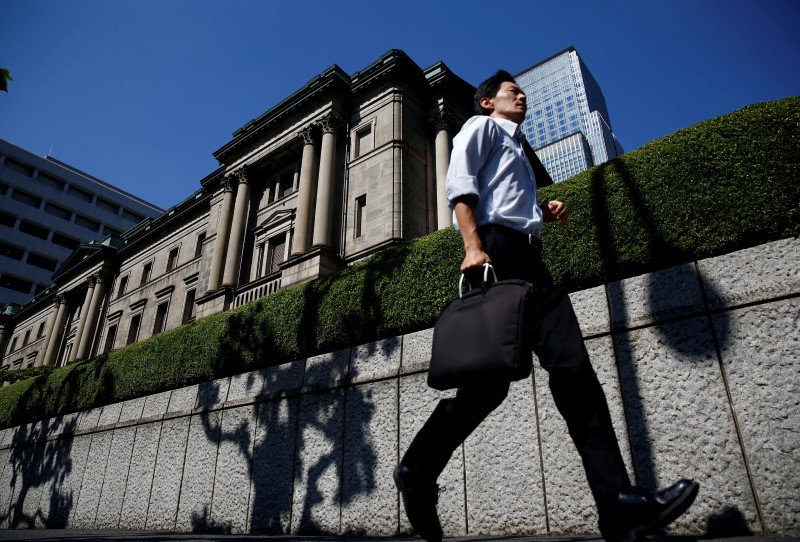By Leika Kihara
TOKYO (Reuters) - The Bank of Japan's policy review could put up for debate its target for expanding base money through massive asset purchases, sources say, but the challenge would be to avoid spooking bond markets used to years of unprecedented buying.
The BOJ's announcement last month of a thorough review of its policy and its effects triggered a sharp bond sell-off as investors feared the central bank, wary of its dwindling policy tools, might lean toward reducing its government bond purchases.
It is currently buying roughly 110-120 trillion yen in bonds each year to meet its pledge to expand base money - or cash and deposits in circulation - by an annual 80 trillion yen (610.8 billion pounds).
But after initial successes in the asset-buying programme, which is aimed at ending two decades of deflationary pressure, prices are falling again.
Sources told Reuters last week that the BOJ had already prepared an outline of the review that will maintain its pledge to hit 2 percent inflation as soon as possible.
That suggested that the most likely outcome of the review might be modest fine-tuning of its "quantitative and qualitative easing" (QQE) programme, which combines buying bonds and riskier assets with negative interest rates.
Tweaks might include changing the average duration of bonds the BOJ holds, currently between seven and 12 years, so that the central bank has more flexibility over which bonds to buy when assessing market supply and demand.
But sources familiar with the BOJ's thinking say a more radical makeover of the programme isn't off the table.
One option could be to shift its target from base money to long-term interest rates, which would relieve the BOJ from the pressure to keep up the current level of bond buying, which could soon exhaust the available supply.
"The BOJ is now in a war of attrition, which means it needs to try and extend the lifespan of QQE," said one source.
"Reconsidering the base money target could be one solution."
LONG-TERM TARGET
The idea of reviewing the base money target, floated by several former BOJ executives, has gained support from some in the central bank who have grown doubtful on whether more money printing will help hit 2 percent inflation, the sources said.
"If the BOJ's main goal is to push down long-term rates, one feasible idea is to set an interest rate cap. The BOJ already holds enormous amounts of government bonds, so it can probably keep yields low without buying too much further," said Hideo Hayakawa, a former top BOJ economist who is well versed in the bank's policy.
"This may be the better option, particularly for a country like Japan, which has a huge fiscal deficit," said Hayakawa, whose views are closely followed by incumbent policymakers.
To be clear, there is no consensus yet on how the comprehensive review could affect the direction of monetary policy. It is also uncertain whether this will emerge as a strong option as debate on the review heats up.
But the fact the review is taking place underscores a growing feeling within the BOJ that some changes need to be made to QQE.
SUPPLY CONSTRAINTS
The BOJ already holds a third of the entire government bond market, and the International Monetary Fund has warned the BOJ will run out of bonds to buy in coming years.
Some on the BOJ board, such as former market economists Takehiro Sato and Takahide Kiuchi, have also warned of the side effects of the aggressive bond purchases, such as drying up market liquidity.
With prices sliding three years into the adoption of QQE, there is also less conviction within the BOJ that expanding money printing to meet the base money target has had much impact on inflation expectations.
These factors all heighten the allure of abandoning the base money target, but that risks triggering a sell-off in the government bond market if traders fear the BOJ is withdrawing its stimulus programme, the sources said.
The BOJ could try to limit the risk by committing to keep long-term rates below a certain level, though some BOJ officials worry that any tweaking of the base money target could hurt already weak inflation expectations.
The idea would also face resistance from BOJ Deputy Governor Kikuo Iwata, among the architects of QQE and a staunch believer that printing more money will push up inflation.
Still, the idea would give the BOJ some welcome wiggle room in its bond buying programme, as its rapidly expanding balance sheet boosts the potential losses it would suffer from sharp falls in bond prices.
"It's uncertain whether a cap on long-term rates would work. But it won't be surprising if there was some debate on what to do with the base money target," another of the sources said.
